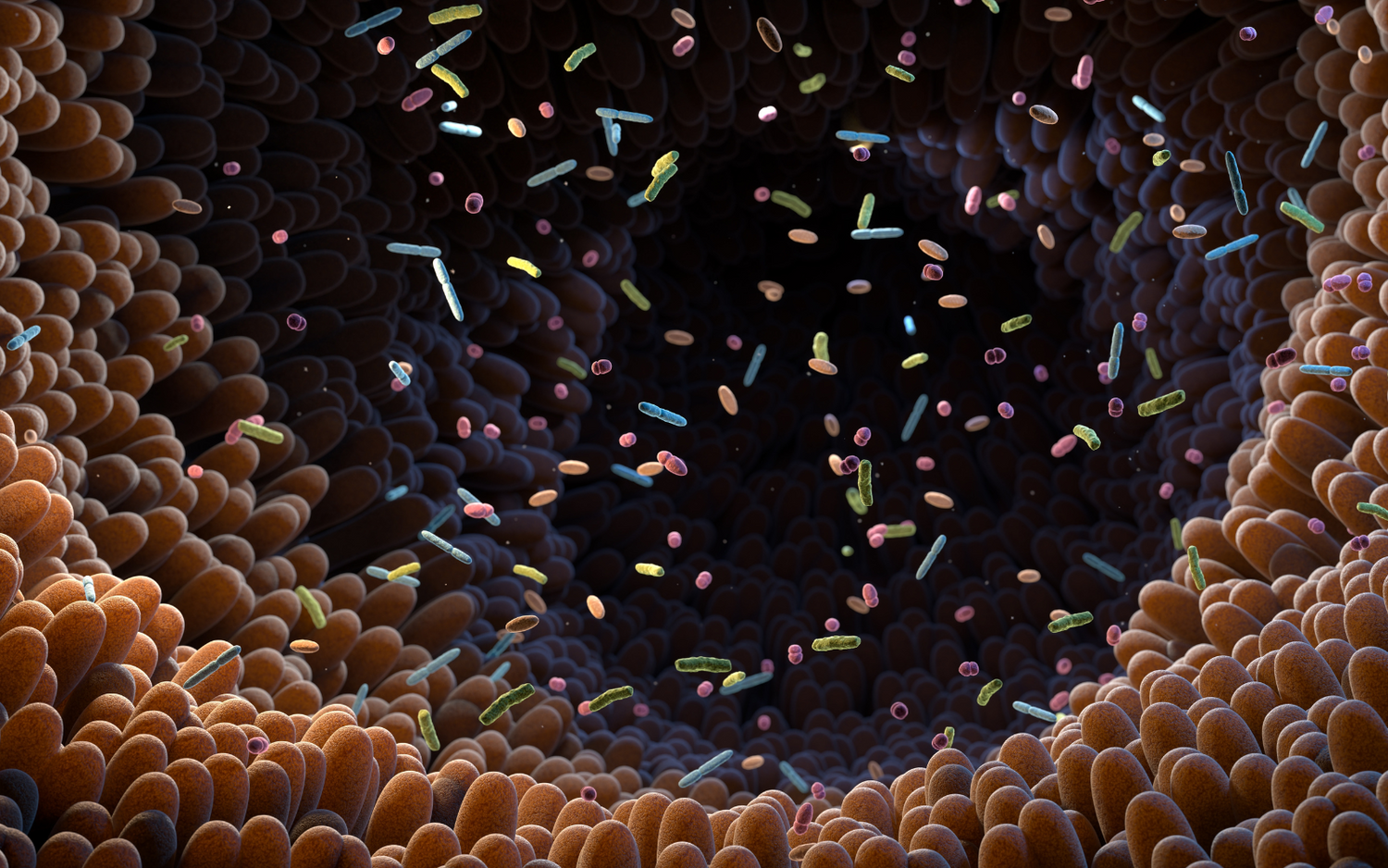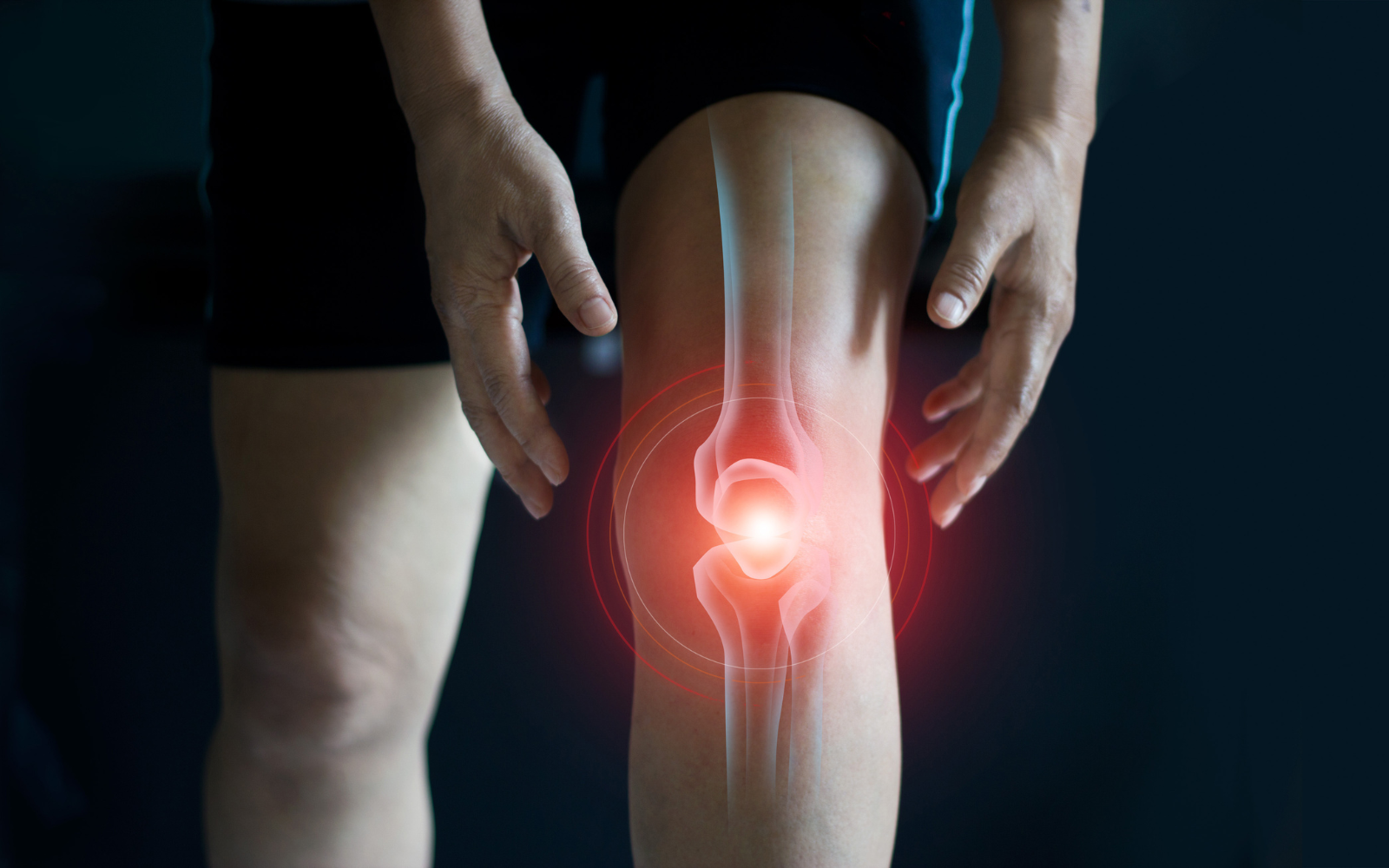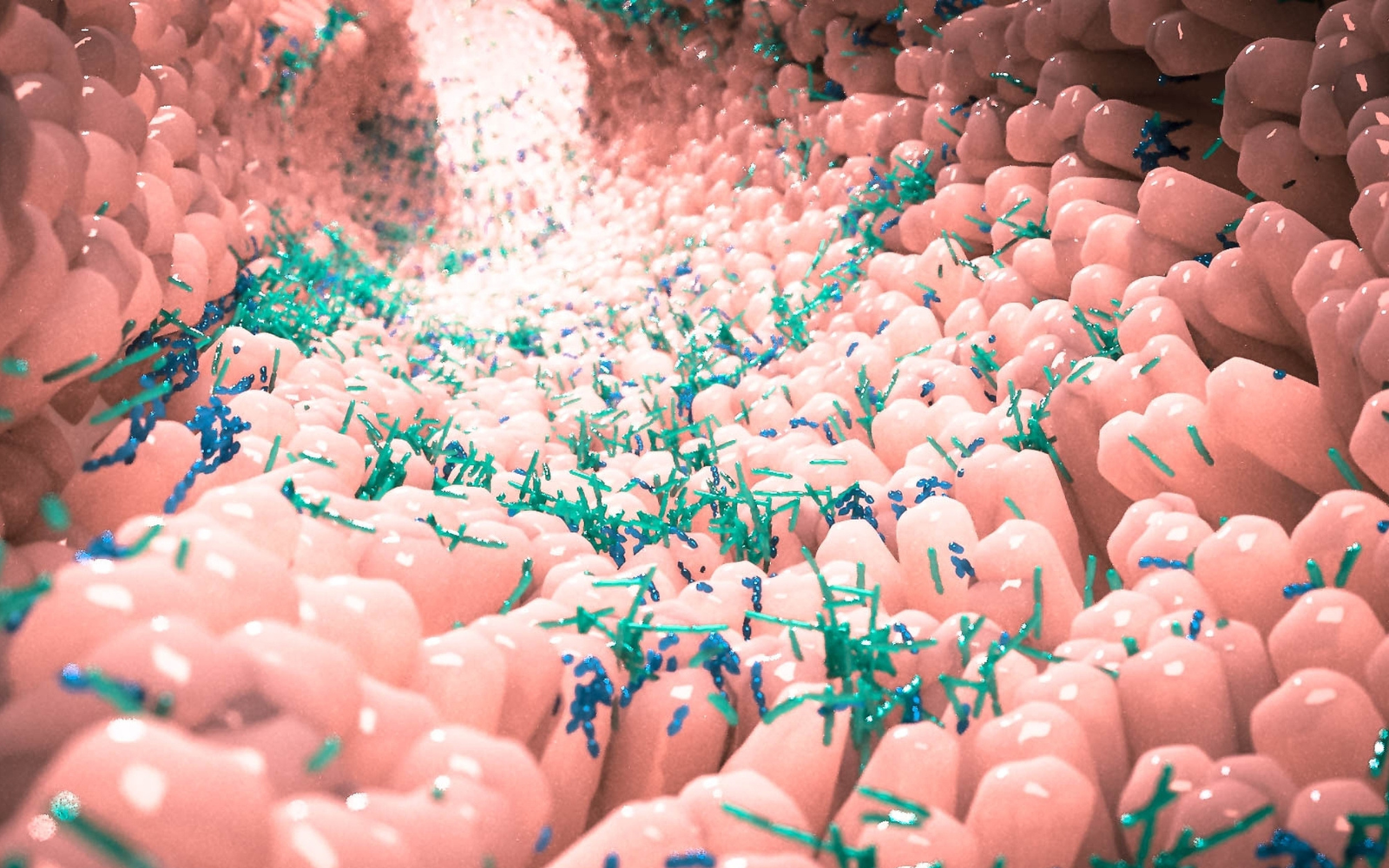Spermidine and the Gut-Brain Axis: What's the Link?
Spermidine's Role in the Gut Microbiome
The human gut microbiome (the community of bacteria living in our gut) is unique to every individual and has many roles in regulating our immune system, metabolism, growth and general health. Spermidine, a natural polyamine, is believed to play an important role in gut microbiome regulation [1]. An intracellular spermidine pool is formed from synthesis in our gut microbiome and tissues, excretion, either from its precursor, another polyamine called putrescine, from the degradation of spermine, or absorbed directly from our diet.
Spermidine and the Brain
Spermidine has been shown to be important for not only gut health but also cognitive function. The recent link found between gut and brain health, termed 'the gut-brain axis' [2], confirms a bidirectional cross-over between the enteric and central nervous systems - with each intrinsically reliant on the other. This means the brain may influence intestinal activities, for instance immune cells, and the gut may influence cognition and general mood. It is therefore now known that to maximize mental health and wellbeing we must maintain a healthy gut microbiome. And spermidine's importance to this gut-brain connection is becoming increasingly apparent, with low levels negatively affecting health, wellbeing and longevity. As we age our intracellular spermidine pool significantly reduces as we become less able to synthesize it ourselves, having negative implications on the gut and in turn on brain health.
Spermidine and Gut Dysbiosis
Aging is defined as the progressive loss of physiological integrity outlined by the 12 proposed 'Hallmarks of aging' [3], where physiological function and vulnerability to death progressively increase as a result. With regards to the gut-brain axis, preventative measures against the hallmark, 'gut microbial dysbiosis' [4], are important for not only gut health but also to prevent cognitive decline.
In normal, healthy conditions, our gut microbiome consists of a diverse collection of microbes that exist in equilibrium. This complex ecosystem within us is essential for immune regulation, efficient digestion, metabolic processes, hormonal regulation and overall health. Optimal gut health relies on gut bacterial diversity in the microbiome, a balance between commensals, potentially harmful bacteria, and functional capacity. When an imbalance or disruption to the gut microbiome occurs, this is known as gut dysbiosis. Novel research suggests gut dysbiosis can negatively impact mood through the gut-brain axis. As we age we become more vulnerable to this, therefore being conscious of gut health through diet and beneficial pre- and probiotics appears essential to prevent dysbiosis and in turn ensure a happy and healthy emotional state.
Spermidine and Mood
Gut microbiota in the small intestine are important for determining polyamine levels [5]. Spermidine, spermine, and putrescine, the most abundant polyamines found in living organisms, are essential in a variety of cellular processes important for maintaining good health and longevity. If a dysregulation in gut microbiota occurs, then polyamine levels may decrease, and this is a characterizing feature of a short healthspan. Accumulating research points to the importance of the polyamine system in preventing the onset of mental disorders [6], with many polyamines and their precursors exhibiting antidepressant and anxiety reducing effects.
Spermidine and SAM-E
There is a growing interest in SAM-E (S-adenosylmethionine), a metabolite present in all living cells, and its positive effect on mental wellbeing [7]. SAM-E initially gained recognition as an alternative to anti-depressant drugs, proving effective for relieving depression devoid of the negative side effects associated with the drugs currently in circulation. This metabolite not only boosts synthesis of positive brain chemicals but has been further proven to promote synthesis of vital functional compounds. Thus, it is thought to be important for preventing or reversing aging disorders. Interestingly, it plays a key role in synthesizing polyamines in the gut, such as spermidine. Given the positive impact mentioned above of maintaining spermidine levels as we age, ]. Although further research is required to consolidate this, SAM-E is a promising novel therapeutic for anti-aging, anti-disease and strengthening cognition.
Spermidine and 'Leaky Gut'
Spermidine also plays a key part in maintaining gut epithelial barrier integrity. In a healthy gut, the lining of the gut wall is composed of tight junctions between adjacent cells which act as a barrier to harmful substances while selectively allowing absorption of key nutrients into our bloodstream. In older adults with poor health, a condition known as 'leaky gut' [8] can occur, where this barrier becomes more porous than it should be. This increase in permeability compromises the selectivity of substances passing into the bloodstream, inappropriately activating the immune system and leading to a variety of health issues from digestive problems to neurological disorders. From research, spermidine can be beneficial in preventing this problem. Primarily, spermidine has been shown to promote autophagy, the cellular process of reusing and disposing of dysfunctional or old cell components, preserving the health of gut cells and maintaining tight junction integrity.
Research has further displayed spermidine's anti-inflammatory and anti-oxidative effects and, as chronic inflammation and harmful reactive oxygen species (ROS) can contribute to damage of gut epithelium, these properties may act as a protective mechanism for gut barrier function.
Finally, spermidine has been found to positively influence cell signaling pathways [9] associated with the gut wall as well as the composition of the gut microbiome. Both are involved in tight junction regulation, thus spermidine is useful in optimizing epithelial gut barrier function.
Spermidine and Inflammation
Beyond the gut epithelial barrier, the anti-inflammatory properties of spermidine are believed to have a positive effect on mood and overall cognitive function. Inflammation in the gut can cause an inappropriate immune signaling response, gut dysbiosis and, as mentioned, compromise gut barrier integrity - all of which may impact the brain via the gut-brain axis. For example, there is emerging evidence linking inflammation and the development of depression in individuals. As inflammation is one of the 12 hallmarks of aging, it is important to be aware of how to reduce and prevent inflammation and the negative knock-on effects it can cause. Notably, multiple studies have shown spermidine supplementation reduces harmful inflammation [10] by playing an integral part in immune response modulation, for example by upregulating anti-inflammatory macrophages. Additionally, healthier lifestyle and dietary choices are a beneficial way of preventing the onset of inflammation, in particular, by opting for foods rich in polyamines.
Spermidine and Autophagy: Brain Health and Sleep
The benefits of targeting the gut-brain axis don’t stop there. Do you struggle with getting enough sleep?
Getting sufficient, good quality sleep is absolutely key to healthy physical and mental wellbeing and overall longevity. As we age, often the duration and quality of our sleep changes. This is due to a negative change in the function of our 'internal body clock' (which dictates our sleep-wake cycle through daily cycles know as 'circadian rhythms'). In older adults, this can manifest as: a shift forward in sleep schedule (becoming fatigued in the afternoon and waking up earlier), waking up through the night, difficulty adjusting to changes in sleep schedule, and daytime drowsiness. It is estimated that between 40%-70% of older adults have chronic sleep issues [11], affecting their quality of life significantly. Although changes to sleep architecture are normal throughout lifespan, a decreased need for sleep and sleep disruption are not and thus can be prevented. Given spermidine supplementation has been shown to promote autophagy and autophagy occurs mainly at night in the overnight fasted state, used by the glymphatic system to repair and recycle brain cells, this is a promising therapeutic strategy of preventing the deterioration of our internal body clock. Although the exact mechanism for this is not fully understood, there is strong evidence for positive involvement of spermidine in improving circadian rhythm [12] as we age as it modulates 2 of the 8 clock genes that regulate our body clock. Furthermore, there have been encouraging results from those taking Primeadine - check out gerontologist and host of the Hack My Age podcast, Zora Benhamou's, circadian experiment taking Primeadine spermidine.
Plant-Derived Spermidine Supplements
So how do you boost your polyamine levels and unlock these anti-aging effects for the gut and the brain?
Primeadine is a pure, wholly plant-derived Spermidine supplement - Primeadine Original is made from concentrated Japanese wheat germ extract and Primeadine GF from a unique blend of Okinawan chlorella, turmeric and "Shikuwasa" or citrus lime peel.
As it is food-derived, the spermidine is highly bioavailable. Primeadine Original contains other essential, naturally occurring polyamines - spermine and putrescine, while Primeadine GF contains putrescine, not spermine. The presence of these polyamines further works to accentuate spermidine production, creating a favorable polyamine recycling loop. Taking spermidine supplements therefore helps to retain healthy polyamine levels in the body, supporting gut and brain health.
Reference list:
[1] Tofalo R, Cocchi S, Suzzi G. Polyamines and Gut Microbiota. Front Nutr. 2019 Feb 25;6:16. doi: 10.3389/fnut.2019.00016. PMID: 30859104; PMCID: PMC6397830.
[2] Appleton J. The Gut-Brain Axis: Influence of Microbiota on Mood and Mental Health. Integr Med (Encinitas). 2018 Aug;17(4):28-32. PMID: 31043907; PMCID: PMC6469458.
[3] López-Otín C, Blasco MA, Partridge L, Serrano M, Kroemer G. Hallmarks of aging: An expanding universe. Cell. 2023 Jan 19;186(2):243-278. doi: 10.1016/j.cell.2022.11.001. Epub 2023 Jan 3. PMID: 36599349.
[4] Ragonnaud, E., Biragyn, A. Gut microbiota as the key controllers of “healthy” aging of elderly people. Immun Ageing 18, 2 (2021). https://doi.org/10.1186/s12979-020-00213-w
[5] Tofalo R, Cocchi S and Suzzi G (2019) Polyamines and Gut Microbiota. Front. Nutr. 6:16. doi: 10.3389/fnut.2019.00016
[6] Fiori LM, Turecki G. Implication of the polyamine system in mental disorders. J Psychiatry Neurosci. 2008 Mar;33(2):102-10. PMID: 18330456; PMCID: PMC2265312.
[7] Cuomo A, Beccarini Crescenzi B, Bolognesi S, Goracci A, Koukouna D, Rossi R, Fagiolini A. S-Adenosylmethionine (SAMe) in major depressive disorder (MDD): a clinician-oriented systematic review. Ann Gen Psychiatry. 2020 Sep 5;19:50. doi: 10.1186/s12991-020-00298-z. PMID: 32939220; PMCID: PMC7487540.
[8] Ahmadi S, Wang S, Nagpal R, Wang B, Jain S, Razazan A, Mishra SP, Zhu X, Wang Z, Kavanagh K, Yadav H. A human-origin probiotic cocktail ameliorates aging-related leaky gut and inflammation via modulating the microbiota/taurine/tight junction axis. JCI Insight. 2020 May 7;5(9):e132055. doi: 10.1172/jci.insight.132055. PMID: 32302292; PMCID: PMC7253024.
[9] Ma L, Ni Y, Wang Z, Tu W, Ni L, Zhuge F, Zheng A, Hu L, Zhao Y, Zheng L, Fu Z. Spermidine improves gut barrier integrity and gut microbiota function in diet-induced obese mice. Gut Microbes. 2020 Nov 9;12(1):1-19. doi: 10.1080/19490976.2020.1832857. PMID: 33151120; PMCID: PMC7668533.
[10] Anna Niechcial, Marlene Schwarzfischer, Marcin Wawrzyniak, Kirstin Atrott, Andrea Laimbacher, Yasser Morsy, Egle Katkeviciute, Janine Häfliger, Patrick Westermann, Cezmi A Akdis, Michael Scharl, Marianne R Spalinger, Spermidine Ameliorates Colitis via Induction of Anti-Inflammatory Macrophages and Prevention of Intestinal Dysbiosis, Journal of Crohn's and Colitis, Volume 17, Issue 9, September 2023, Pages 1489–1503, https://doi.org/10.1093/ecco-jcc/jjad058
[11] Miner B, Kryger MH. Sleep in the Aging Population. Sleep Med Clin. 2017 Mar;12(1):31-38. doi: 10.1016/j.jsmc.2016.10.008. Epub 2016 Dec 20. PMID: 28159095; PMCID: PMC5300306.
[12] Zwighaft Z, Aviram R, Shalev M, Rousso-Noori L, Kraut-Cohen J, Golik M, Brandis A, Reinke H, Aharoni A, Kahana C, Asher G. Circadian Clock Control by Polyamine Levels through a Mechanism that Declines with Age. Cell Metab. 2015 Nov 3;22(5):874-85. doi: 10.1016/j.cmet.2015.09.011. Epub 2015 Oct 8. PMID: 26456331.





Leave a comment
All comments are moderated before being published.
This site is protected by hCaptcha and the hCaptcha Privacy Policy and Terms of Service apply.